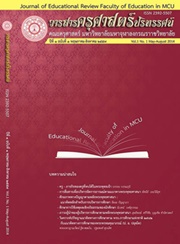Potential of Wisdom in Buddhism: Principal Concept for Educational Administration
Main Article Content
Abstract
All levels of education placed a focus on training people to be more
potential. One of the principles that educators or executives in education should
take into account was the trust in intellectual potential of human beings, i.e. they
should not underestimate learning ability and personal development of students
even they were different in learning levels. The Buddha was the distinguished
example in providing opportunities for people to develop themselves equally
despite they had different levels of intelligence. With wisdom development, human
beings could attain equality. This article aimed to introduce the concept of
intellectual potential, origin of wisdom and functions of wisdom in order to convince
educators and education executives realizing their own intellectual potential, keeping
one’s own intellectual developed, accepting students’ intellectual potential, living a
Article Details
ทัศนะและความคิดเห็นที่ปรากฏในบทความในวารสารฉบับนี้ถือเป็นความรับผิดชอบของผู้เขียนบทความนั้นเพียงผู้เดียว และไม่ถือเป็นทัศนะและความรับผิดชอบของกองบรรณาธิการ
กองบรรณาธิการขอสงวนสิทธิ์ในการคัดเลือกบทความลงตีพิมพ์และจะแจ้งให้เจ้าของบทความทราบหลังจากผู้ประเมินบทความตรวจอ่านบทความแล้ว
ต้นฉบับที่ได้รับการตีพิมพ์ในวารสารครุศาสตร์ปริทรรศน์ คณะครุศาสตร์ มหาวิทยาลัยมหาจุฬาลงกรณราชวิทยาลัย ถือเป็นกรรมสิทธิ์ของคณะครุศาสตร์ มหาวิทยาลัยมหาจุฬาลงกรณราชวิทยาลัย ห้ามนำข้อความทั้งหมดหรือบางส่วนไปพิมพ์ซ้ำ เว้นเสียแต่ว่าจะได้รับอนุญาตจากมหาวิทยาลัยฯ เป็นลายลักษณ์อักษร


